Health and Social Care: Statutory Requirements and Record Keeping
VerifiedAdded on 2020/12/30
|9
|2178
|316
Report
AI Summary
This report focuses on health and social care practices, particularly within the NHS, emphasizing statutory requirements for reporting and record-keeping. It details the importance of maintaining accurate records, including the General Data Protection Regulation, Freedom of Information Act, and Human Rights Act. The report outlines the roles of regulatory and inspecting bodies, such as those ensuring fundamental standards of care and professional codes of conduct, and the processes for storing records, from creation to disposal. It also explores the reasons for sharing information within and outside the care setting, and the internal and external requirements for recording information. The conclusion highlights the significance of these practices in promoting effective well-being and adherence to regulations within the health and social care sector.
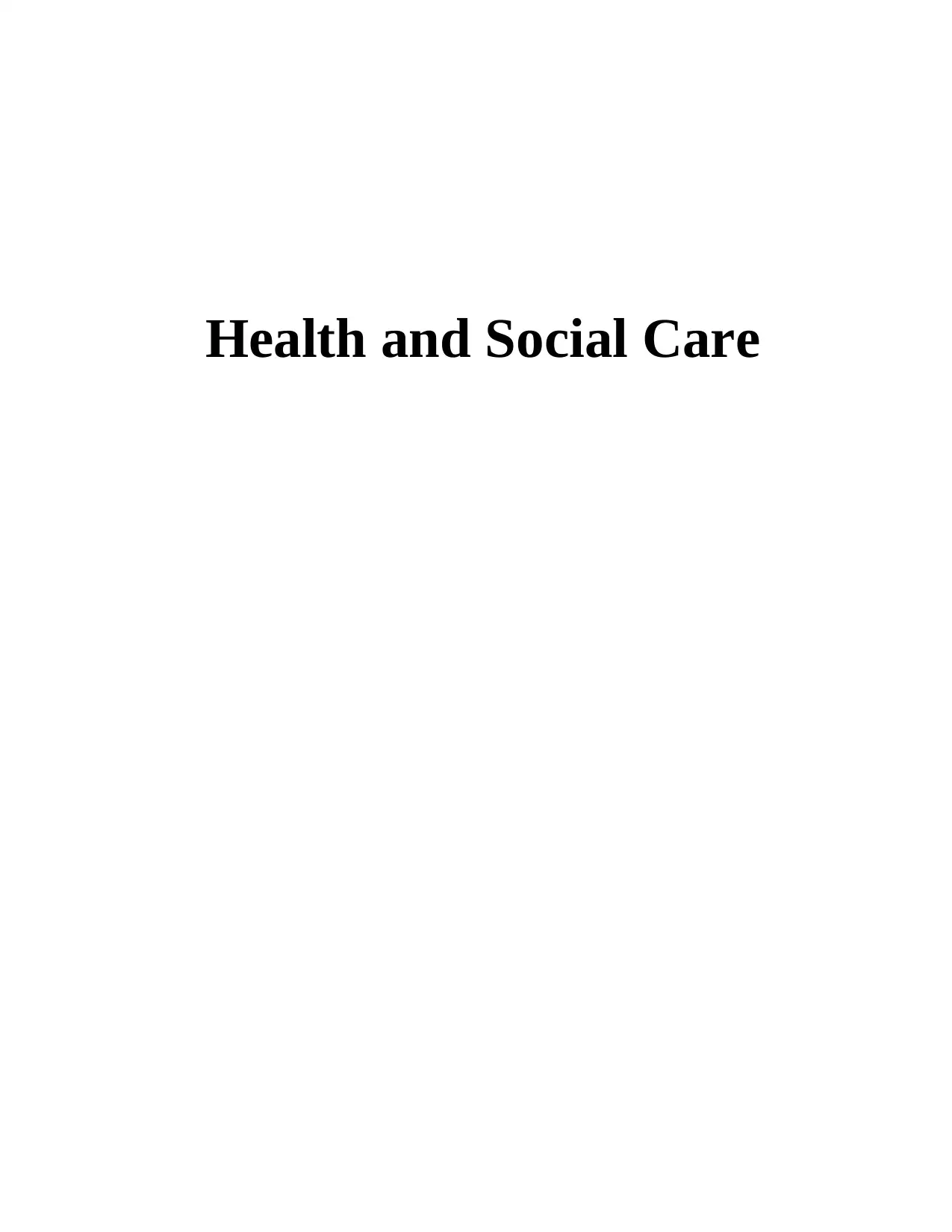
Health and Social Care
Paraphrase This Document
Need a fresh take? Get an instant paraphrase of this document with our AI Paraphraser
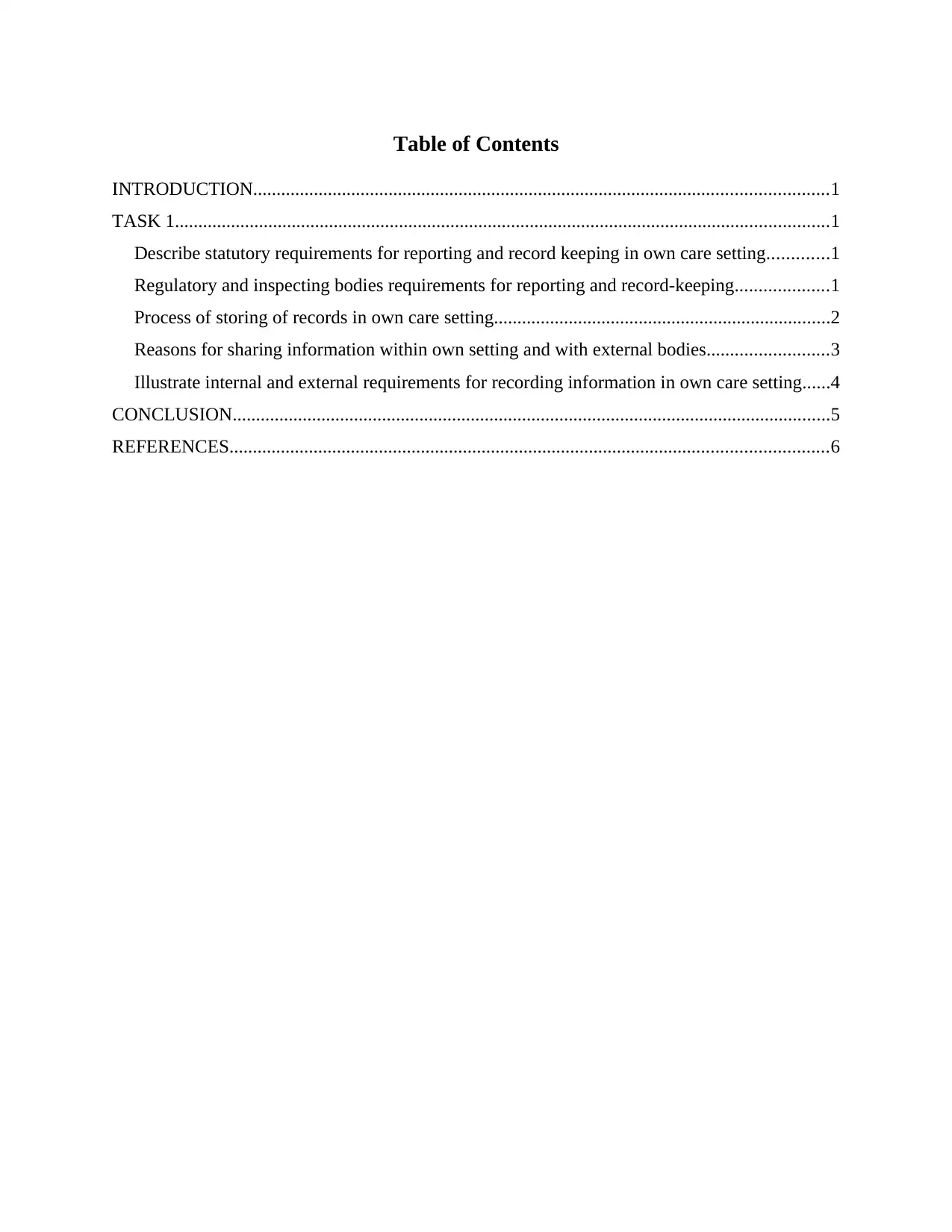
Table of Contents
INTRODUCTION...........................................................................................................................1
TASK 1............................................................................................................................................1
Describe statutory requirements for reporting and record keeping in own care setting.............1
Regulatory and inspecting bodies requirements for reporting and record-keeping....................1
Process of storing of records in own care setting........................................................................2
Reasons for sharing information within own setting and with external bodies..........................3
Illustrate internal and external requirements for recording information in own care setting......4
CONCLUSION................................................................................................................................5
REFERENCES................................................................................................................................6
INTRODUCTION...........................................................................................................................1
TASK 1............................................................................................................................................1
Describe statutory requirements for reporting and record keeping in own care setting.............1
Regulatory and inspecting bodies requirements for reporting and record-keeping....................1
Process of storing of records in own care setting........................................................................2
Reasons for sharing information within own setting and with external bodies..........................3
Illustrate internal and external requirements for recording information in own care setting......4
CONCLUSION................................................................................................................................5
REFERENCES................................................................................................................................6
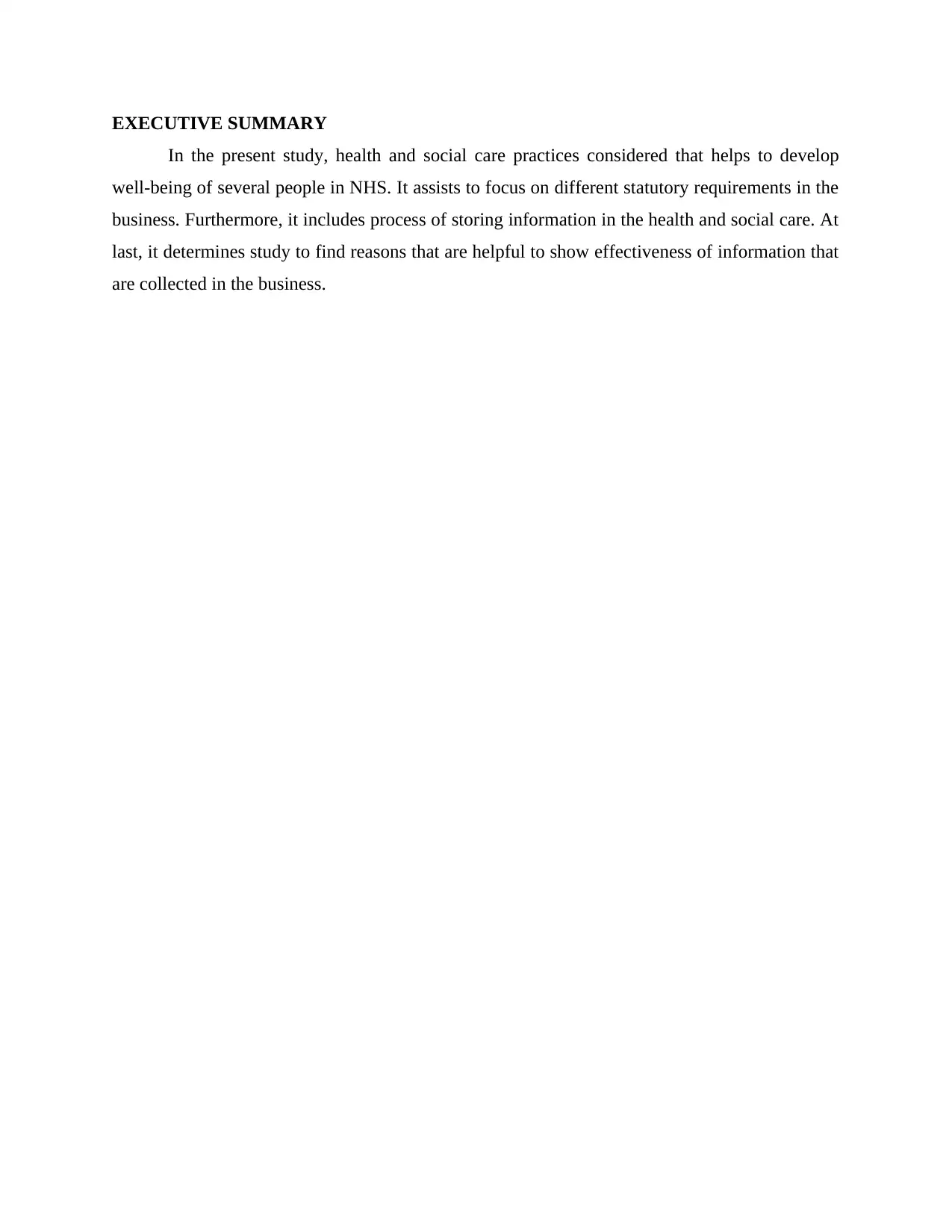
EXECUTIVE SUMMARY
In the present study, health and social care practices considered that helps to develop
well-being of several people in NHS. It assists to focus on different statutory requirements in the
business. Furthermore, it includes process of storing information in the health and social care. At
last, it determines study to find reasons that are helpful to show effectiveness of information that
are collected in the business.
In the present study, health and social care practices considered that helps to develop
well-being of several people in NHS. It assists to focus on different statutory requirements in the
business. Furthermore, it includes process of storing information in the health and social care. At
last, it determines study to find reasons that are helpful to show effectiveness of information that
are collected in the business.
⊘ This is a preview!⊘
Do you want full access?
Subscribe today to unlock all pages.

Trusted by 1+ million students worldwide
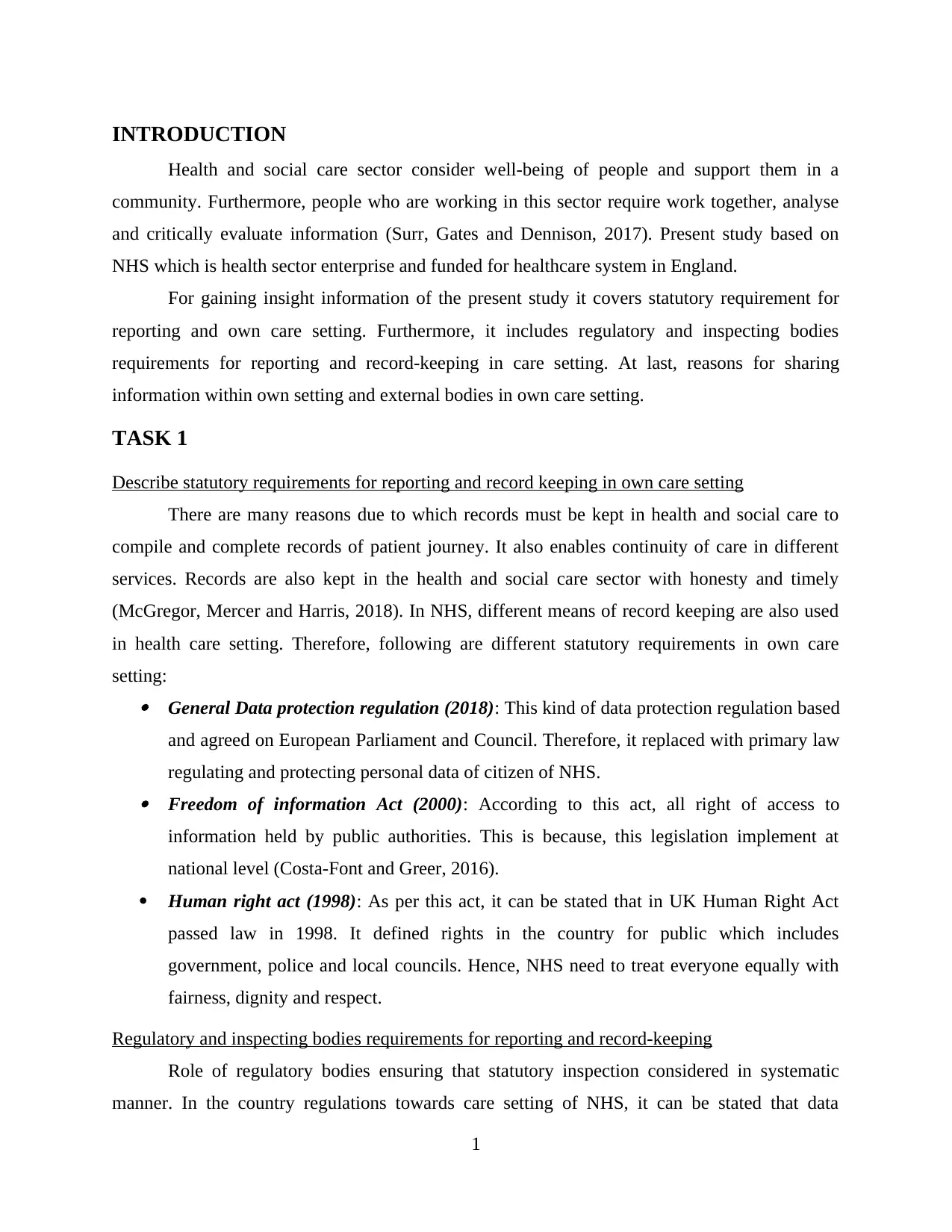
INTRODUCTION
Health and social care sector consider well-being of people and support them in a
community. Furthermore, people who are working in this sector require work together, analyse
and critically evaluate information (Surr, Gates and Dennison, 2017). Present study based on
NHS which is health sector enterprise and funded for healthcare system in England.
For gaining insight information of the present study it covers statutory requirement for
reporting and own care setting. Furthermore, it includes regulatory and inspecting bodies
requirements for reporting and record-keeping in care setting. At last, reasons for sharing
information within own setting and external bodies in own care setting.
TASK 1
Describe statutory requirements for reporting and record keeping in own care setting
There are many reasons due to which records must be kept in health and social care to
compile and complete records of patient journey. It also enables continuity of care in different
services. Records are also kept in the health and social care sector with honesty and timely
(McGregor, Mercer and Harris, 2018). In NHS, different means of record keeping are also used
in health care setting. Therefore, following are different statutory requirements in own care
setting: General Data protection regulation (2018): This kind of data protection regulation based
and agreed on European Parliament and Council. Therefore, it replaced with primary law
regulating and protecting personal data of citizen of NHS. Freedom of information Act (2000): According to this act, all right of access to
information held by public authorities. This is because, this legislation implement at
national level (Costa-Font and Greer, 2016).
Human right act (1998): As per this act, it can be stated that in UK Human Right Act
passed law in 1998. It defined rights in the country for public which includes
government, police and local councils. Hence, NHS need to treat everyone equally with
fairness, dignity and respect.
Regulatory and inspecting bodies requirements for reporting and record-keeping
Role of regulatory bodies ensuring that statutory inspection considered in systematic
manner. In the country regulations towards care setting of NHS, it can be stated that data
1
Health and social care sector consider well-being of people and support them in a
community. Furthermore, people who are working in this sector require work together, analyse
and critically evaluate information (Surr, Gates and Dennison, 2017). Present study based on
NHS which is health sector enterprise and funded for healthcare system in England.
For gaining insight information of the present study it covers statutory requirement for
reporting and own care setting. Furthermore, it includes regulatory and inspecting bodies
requirements for reporting and record-keeping in care setting. At last, reasons for sharing
information within own setting and external bodies in own care setting.
TASK 1
Describe statutory requirements for reporting and record keeping in own care setting
There are many reasons due to which records must be kept in health and social care to
compile and complete records of patient journey. It also enables continuity of care in different
services. Records are also kept in the health and social care sector with honesty and timely
(McGregor, Mercer and Harris, 2018). In NHS, different means of record keeping are also used
in health care setting. Therefore, following are different statutory requirements in own care
setting: General Data protection regulation (2018): This kind of data protection regulation based
and agreed on European Parliament and Council. Therefore, it replaced with primary law
regulating and protecting personal data of citizen of NHS. Freedom of information Act (2000): According to this act, all right of access to
information held by public authorities. This is because, this legislation implement at
national level (Costa-Font and Greer, 2016).
Human right act (1998): As per this act, it can be stated that in UK Human Right Act
passed law in 1998. It defined rights in the country for public which includes
government, police and local councils. Hence, NHS need to treat everyone equally with
fairness, dignity and respect.
Regulatory and inspecting bodies requirements for reporting and record-keeping
Role of regulatory bodies ensuring that statutory inspection considered in systematic
manner. In the country regulations towards care setting of NHS, it can be stated that data
1
Paraphrase This Document
Need a fresh take? Get an instant paraphrase of this document with our AI Paraphraser
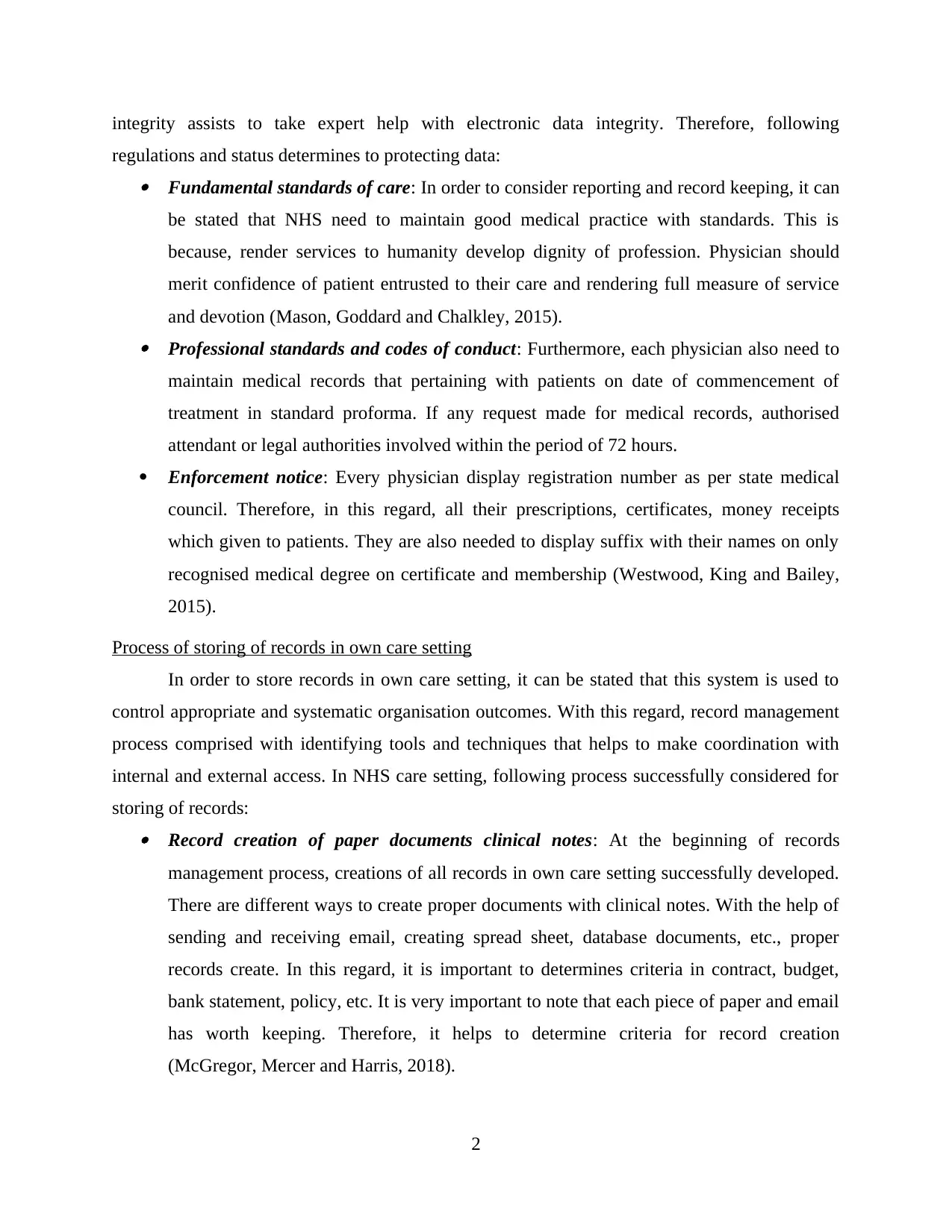
integrity assists to take expert help with electronic data integrity. Therefore, following
regulations and status determines to protecting data: Fundamental standards of care: In order to consider reporting and record keeping, it can
be stated that NHS need to maintain good medical practice with standards. This is
because, render services to humanity develop dignity of profession. Physician should
merit confidence of patient entrusted to their care and rendering full measure of service
and devotion (Mason, Goddard and Chalkley, 2015). Professional standards and codes of conduct: Furthermore, each physician also need to
maintain medical records that pertaining with patients on date of commencement of
treatment in standard proforma. If any request made for medical records, authorised
attendant or legal authorities involved within the period of 72 hours.
Enforcement notice: Every physician display registration number as per state medical
council. Therefore, in this regard, all their prescriptions, certificates, money receipts
which given to patients. They are also needed to display suffix with their names on only
recognised medical degree on certificate and membership (Westwood, King and Bailey,
2015).
Process of storing of records in own care setting
In order to store records in own care setting, it can be stated that this system is used to
control appropriate and systematic organisation outcomes. With this regard, record management
process comprised with identifying tools and techniques that helps to make coordination with
internal and external access. In NHS care setting, following process successfully considered for
storing of records: Record creation of paper documents clinical notes: At the beginning of records
management process, creations of all records in own care setting successfully developed.
There are different ways to create proper documents with clinical notes. With the help of
sending and receiving email, creating spread sheet, database documents, etc., proper
records create. In this regard, it is important to determines criteria in contract, budget,
bank statement, policy, etc. It is very important to note that each piece of paper and email
has worth keeping. Therefore, it helps to determine criteria for record creation
(McGregor, Mercer and Harris, 2018).
2
regulations and status determines to protecting data: Fundamental standards of care: In order to consider reporting and record keeping, it can
be stated that NHS need to maintain good medical practice with standards. This is
because, render services to humanity develop dignity of profession. Physician should
merit confidence of patient entrusted to their care and rendering full measure of service
and devotion (Mason, Goddard and Chalkley, 2015). Professional standards and codes of conduct: Furthermore, each physician also need to
maintain medical records that pertaining with patients on date of commencement of
treatment in standard proforma. If any request made for medical records, authorised
attendant or legal authorities involved within the period of 72 hours.
Enforcement notice: Every physician display registration number as per state medical
council. Therefore, in this regard, all their prescriptions, certificates, money receipts
which given to patients. They are also needed to display suffix with their names on only
recognised medical degree on certificate and membership (Westwood, King and Bailey,
2015).
Process of storing of records in own care setting
In order to store records in own care setting, it can be stated that this system is used to
control appropriate and systematic organisation outcomes. With this regard, record management
process comprised with identifying tools and techniques that helps to make coordination with
internal and external access. In NHS care setting, following process successfully considered for
storing of records: Record creation of paper documents clinical notes: At the beginning of records
management process, creations of all records in own care setting successfully developed.
There are different ways to create proper documents with clinical notes. With the help of
sending and receiving email, creating spread sheet, database documents, etc., proper
records create. In this regard, it is important to determines criteria in contract, budget,
bank statement, policy, etc. It is very important to note that each piece of paper and email
has worth keeping. Therefore, it helps to determine criteria for record creation
(McGregor, Mercer and Harris, 2018).
2
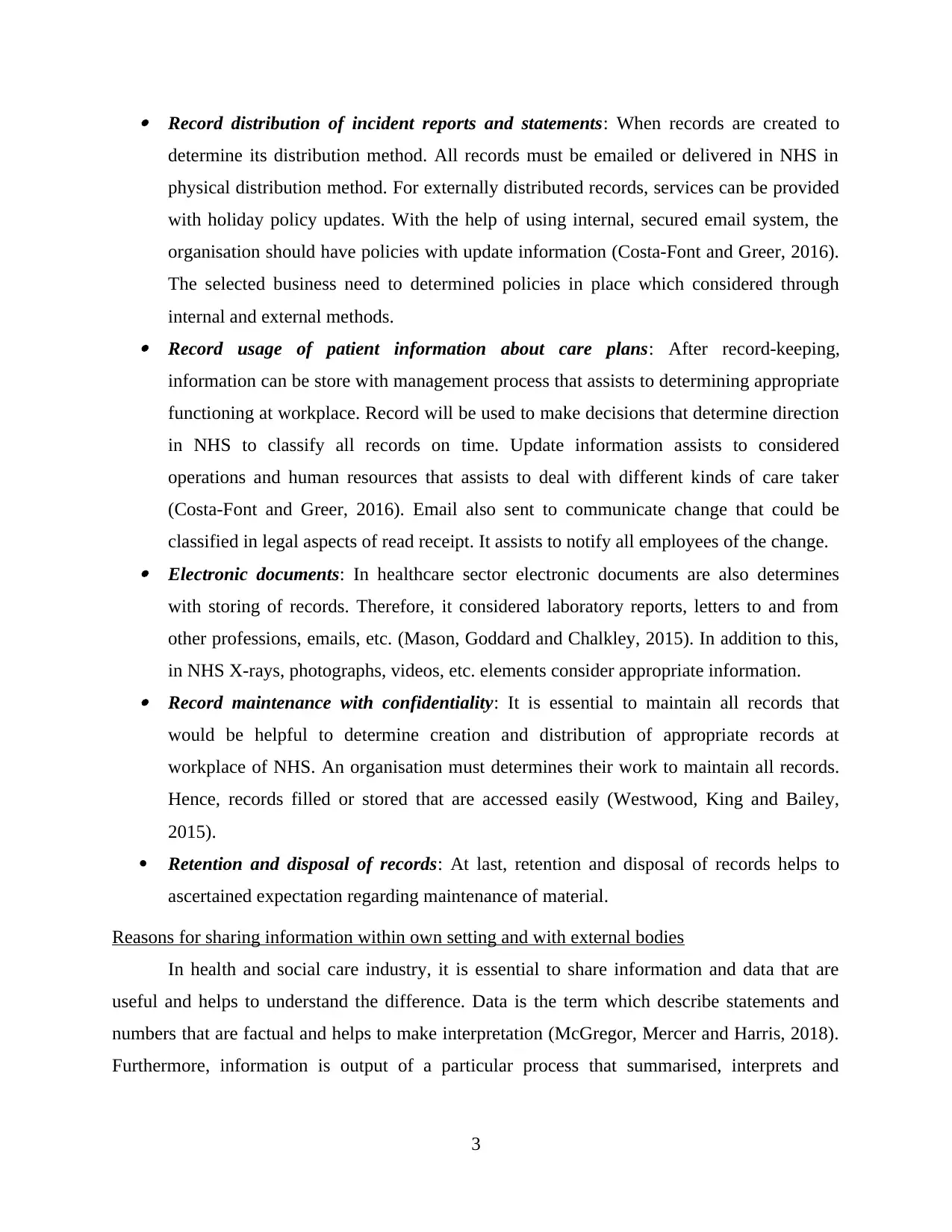
Record distribution of incident reports and statements: When records are created to
determine its distribution method. All records must be emailed or delivered in NHS in
physical distribution method. For externally distributed records, services can be provided
with holiday policy updates. With the help of using internal, secured email system, the
organisation should have policies with update information (Costa-Font and Greer, 2016).
The selected business need to determined policies in place which considered through
internal and external methods. Record usage of patient information about care plans: After record-keeping,
information can be store with management process that assists to determining appropriate
functioning at workplace. Record will be used to make decisions that determine direction
in NHS to classify all records on time. Update information assists to considered
operations and human resources that assists to deal with different kinds of care taker
(Costa-Font and Greer, 2016). Email also sent to communicate change that could be
classified in legal aspects of read receipt. It assists to notify all employees of the change. Electronic documents: In healthcare sector electronic documents are also determines
with storing of records. Therefore, it considered laboratory reports, letters to and from
other professions, emails, etc. (Mason, Goddard and Chalkley, 2015). In addition to this,
in NHS X-rays, photographs, videos, etc. elements consider appropriate information. Record maintenance with confidentiality: It is essential to maintain all records that
would be helpful to determine creation and distribution of appropriate records at
workplace of NHS. An organisation must determines their work to maintain all records.
Hence, records filled or stored that are accessed easily (Westwood, King and Bailey,
2015).
Retention and disposal of records: At last, retention and disposal of records helps to
ascertained expectation regarding maintenance of material.
Reasons for sharing information within own setting and with external bodies
In health and social care industry, it is essential to share information and data that are
useful and helps to understand the difference. Data is the term which describe statements and
numbers that are factual and helps to make interpretation (McGregor, Mercer and Harris, 2018).
Furthermore, information is output of a particular process that summarised, interprets and
3
determine its distribution method. All records must be emailed or delivered in NHS in
physical distribution method. For externally distributed records, services can be provided
with holiday policy updates. With the help of using internal, secured email system, the
organisation should have policies with update information (Costa-Font and Greer, 2016).
The selected business need to determined policies in place which considered through
internal and external methods. Record usage of patient information about care plans: After record-keeping,
information can be store with management process that assists to determining appropriate
functioning at workplace. Record will be used to make decisions that determine direction
in NHS to classify all records on time. Update information assists to considered
operations and human resources that assists to deal with different kinds of care taker
(Costa-Font and Greer, 2016). Email also sent to communicate change that could be
classified in legal aspects of read receipt. It assists to notify all employees of the change. Electronic documents: In healthcare sector electronic documents are also determines
with storing of records. Therefore, it considered laboratory reports, letters to and from
other professions, emails, etc. (Mason, Goddard and Chalkley, 2015). In addition to this,
in NHS X-rays, photographs, videos, etc. elements consider appropriate information. Record maintenance with confidentiality: It is essential to maintain all records that
would be helpful to determine creation and distribution of appropriate records at
workplace of NHS. An organisation must determines their work to maintain all records.
Hence, records filled or stored that are accessed easily (Westwood, King and Bailey,
2015).
Retention and disposal of records: At last, retention and disposal of records helps to
ascertained expectation regarding maintenance of material.
Reasons for sharing information within own setting and with external bodies
In health and social care industry, it is essential to share information and data that are
useful and helps to understand the difference. Data is the term which describe statements and
numbers that are factual and helps to make interpretation (McGregor, Mercer and Harris, 2018).
Furthermore, information is output of a particular process that summarised, interprets and
3
⊘ This is a preview!⊘
Do you want full access?
Subscribe today to unlock all pages.

Trusted by 1+ million students worldwide
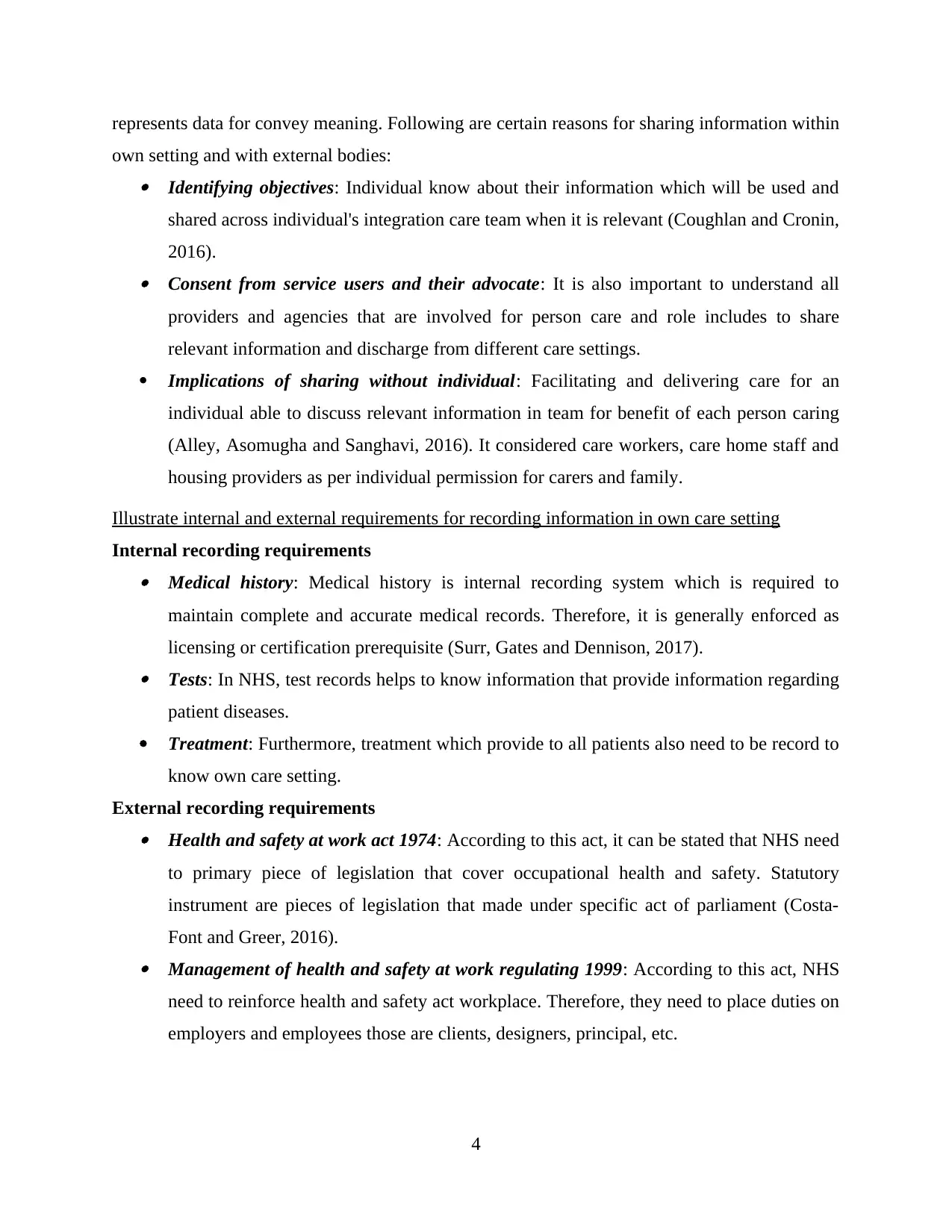
represents data for convey meaning. Following are certain reasons for sharing information within
own setting and with external bodies: Identifying objectives: Individual know about their information which will be used and
shared across individual's integration care team when it is relevant (Coughlan and Cronin,
2016). Consent from service users and their advocate: It is also important to understand all
providers and agencies that are involved for person care and role includes to share
relevant information and discharge from different care settings.
Implications of sharing without individual: Facilitating and delivering care for an
individual able to discuss relevant information in team for benefit of each person caring
(Alley, Asomugha and Sanghavi, 2016). It considered care workers, care home staff and
housing providers as per individual permission for carers and family.
Illustrate internal and external requirements for recording information in own care setting
Internal recording requirements Medical history: Medical history is internal recording system which is required to
maintain complete and accurate medical records. Therefore, it is generally enforced as
licensing or certification prerequisite (Surr, Gates and Dennison, 2017). Tests: In NHS, test records helps to know information that provide information regarding
patient diseases.
Treatment: Furthermore, treatment which provide to all patients also need to be record to
know own care setting.
External recording requirements Health and safety at work act 1974: According to this act, it can be stated that NHS need
to primary piece of legislation that cover occupational health and safety. Statutory
instrument are pieces of legislation that made under specific act of parliament (Costa-
Font and Greer, 2016). Management of health and safety at work regulating 1999: According to this act, NHS
need to reinforce health and safety act workplace. Therefore, they need to place duties on
employers and employees those are clients, designers, principal, etc.
4
own setting and with external bodies: Identifying objectives: Individual know about their information which will be used and
shared across individual's integration care team when it is relevant (Coughlan and Cronin,
2016). Consent from service users and their advocate: It is also important to understand all
providers and agencies that are involved for person care and role includes to share
relevant information and discharge from different care settings.
Implications of sharing without individual: Facilitating and delivering care for an
individual able to discuss relevant information in team for benefit of each person caring
(Alley, Asomugha and Sanghavi, 2016). It considered care workers, care home staff and
housing providers as per individual permission for carers and family.
Illustrate internal and external requirements for recording information in own care setting
Internal recording requirements Medical history: Medical history is internal recording system which is required to
maintain complete and accurate medical records. Therefore, it is generally enforced as
licensing or certification prerequisite (Surr, Gates and Dennison, 2017). Tests: In NHS, test records helps to know information that provide information regarding
patient diseases.
Treatment: Furthermore, treatment which provide to all patients also need to be record to
know own care setting.
External recording requirements Health and safety at work act 1974: According to this act, it can be stated that NHS need
to primary piece of legislation that cover occupational health and safety. Statutory
instrument are pieces of legislation that made under specific act of parliament (Costa-
Font and Greer, 2016). Management of health and safety at work regulating 1999: According to this act, NHS
need to reinforce health and safety act workplace. Therefore, they need to place duties on
employers and employees those are clients, designers, principal, etc.
4
Paraphrase This Document
Need a fresh take? Get an instant paraphrase of this document with our AI Paraphraser
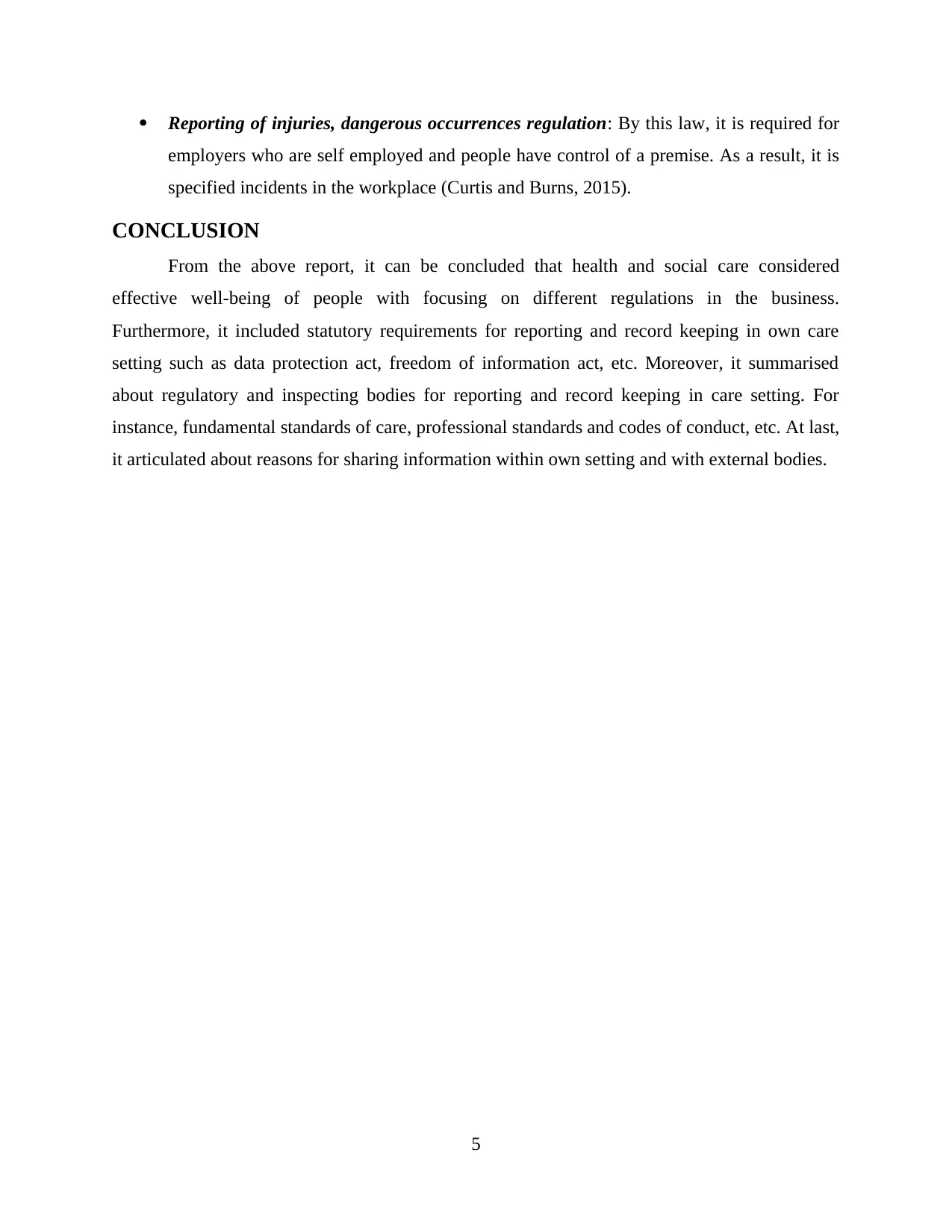
Reporting of injuries, dangerous occurrences regulation: By this law, it is required for
employers who are self employed and people have control of a premise. As a result, it is
specified incidents in the workplace (Curtis and Burns, 2015).
CONCLUSION
From the above report, it can be concluded that health and social care considered
effective well-being of people with focusing on different regulations in the business.
Furthermore, it included statutory requirements for reporting and record keeping in own care
setting such as data protection act, freedom of information act, etc. Moreover, it summarised
about regulatory and inspecting bodies for reporting and record keeping in care setting. For
instance, fundamental standards of care, professional standards and codes of conduct, etc. At last,
it articulated about reasons for sharing information within own setting and with external bodies.
5
employers who are self employed and people have control of a premise. As a result, it is
specified incidents in the workplace (Curtis and Burns, 2015).
CONCLUSION
From the above report, it can be concluded that health and social care considered
effective well-being of people with focusing on different regulations in the business.
Furthermore, it included statutory requirements for reporting and record keeping in own care
setting such as data protection act, freedom of information act, etc. Moreover, it summarised
about regulatory and inspecting bodies for reporting and record keeping in care setting. For
instance, fundamental standards of care, professional standards and codes of conduct, etc. At last,
it articulated about reasons for sharing information within own setting and with external bodies.
5
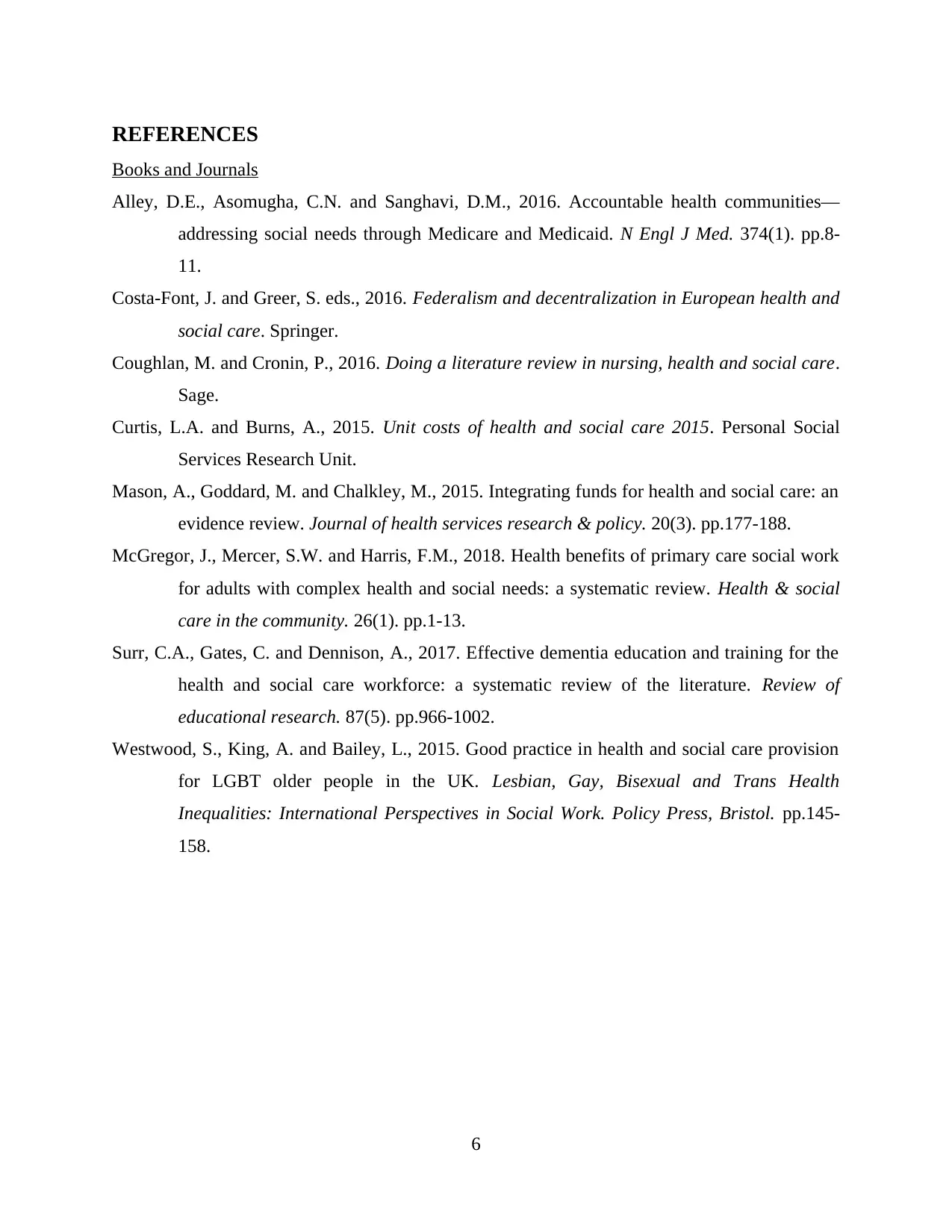
REFERENCES
Books and Journals
Alley, D.E., Asomugha, C.N. and Sanghavi, D.M., 2016. Accountable health communities—
addressing social needs through Medicare and Medicaid. N Engl J Med. 374(1). pp.8-
11.
Costa-Font, J. and Greer, S. eds., 2016. Federalism and decentralization in European health and
social care. Springer.
Coughlan, M. and Cronin, P., 2016. Doing a literature review in nursing, health and social care.
Sage.
Curtis, L.A. and Burns, A., 2015. Unit costs of health and social care 2015. Personal Social
Services Research Unit.
Mason, A., Goddard, M. and Chalkley, M., 2015. Integrating funds for health and social care: an
evidence review. Journal of health services research & policy. 20(3). pp.177-188.
McGregor, J., Mercer, S.W. and Harris, F.M., 2018. Health benefits of primary care social work
for adults with complex health and social needs: a systematic review. Health & social
care in the community. 26(1). pp.1-13.
Surr, C.A., Gates, C. and Dennison, A., 2017. Effective dementia education and training for the
health and social care workforce: a systematic review of the literature. Review of
educational research. 87(5). pp.966-1002.
Westwood, S., King, A. and Bailey, L., 2015. Good practice in health and social care provision
for LGBT older people in the UK. Lesbian, Gay, Bisexual and Trans Health
Inequalities: International Perspectives in Social Work. Policy Press, Bristol. pp.145-
158.
6
Books and Journals
Alley, D.E., Asomugha, C.N. and Sanghavi, D.M., 2016. Accountable health communities—
addressing social needs through Medicare and Medicaid. N Engl J Med. 374(1). pp.8-
11.
Costa-Font, J. and Greer, S. eds., 2016. Federalism and decentralization in European health and
social care. Springer.
Coughlan, M. and Cronin, P., 2016. Doing a literature review in nursing, health and social care.
Sage.
Curtis, L.A. and Burns, A., 2015. Unit costs of health and social care 2015. Personal Social
Services Research Unit.
Mason, A., Goddard, M. and Chalkley, M., 2015. Integrating funds for health and social care: an
evidence review. Journal of health services research & policy. 20(3). pp.177-188.
McGregor, J., Mercer, S.W. and Harris, F.M., 2018. Health benefits of primary care social work
for adults with complex health and social needs: a systematic review. Health & social
care in the community. 26(1). pp.1-13.
Surr, C.A., Gates, C. and Dennison, A., 2017. Effective dementia education and training for the
health and social care workforce: a systematic review of the literature. Review of
educational research. 87(5). pp.966-1002.
Westwood, S., King, A. and Bailey, L., 2015. Good practice in health and social care provision
for LGBT older people in the UK. Lesbian, Gay, Bisexual and Trans Health
Inequalities: International Perspectives in Social Work. Policy Press, Bristol. pp.145-
158.
6
⊘ This is a preview!⊘
Do you want full access?
Subscribe today to unlock all pages.

Trusted by 1+ million students worldwide
1 out of 9
Related Documents
Your All-in-One AI-Powered Toolkit for Academic Success.
+13062052269
info@desklib.com
Available 24*7 on WhatsApp / Email
![[object Object]](/_next/static/media/star-bottom.7253800d.svg)
Unlock your academic potential
Copyright © 2020–2026 A2Z Services. All Rights Reserved. Developed and managed by ZUCOL.





